|
|
|
Sort Order |
|
|
|
Items / Page
|
|
|
|
|
|
|
| Srl | Item |
| 1 |
ID:
103994
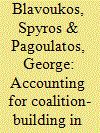

|
|
|
|
|
| Publication |
2011.
|
| Summary/Abstract |
Which parameters affect coalition building in budgetary negotiations? In this article, three distinct levels of analysis are identified to account for coalition building patterns, associated with domestic politics, domestic socioeconomic structures and EU politics. At the level of domestic politics, ideology points to cross-governmental affinity of a partisan nature; at the level of socioeconomic structures, similarity of policy interests, generated by cross-national socioeconomic convergence with EU policy standards, informs coalition formation patterns; at the EU politics level, the intergovernmental power balance influences the political aspirations of each Member State in the integration process and coalition-building decisions. Two sets of parameters affect the evolution of EU coalition patterns, corresponding to the integration impact on the EU (new cleavages) and on the Member States (the impact of Europeanisation). This analytical framework is used to examine the southern coalition (Spain, Greece, Portugal) in the four multi-annual financial frameworks (1988, 1992, 1999 and 2005).
|
|
|
|
|
|
|
|
|
|
|
|
|
|
|
|
| 2 |
ID:
117049
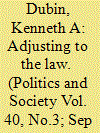

|
|
|
|
|
| Publication |
2012.
|
| Summary/Abstract |
Firms may find competitive adjustment difficult because they are hamstrung by rigid labor market rules. However, such difficulties may also be caused by conflicts between strategic choices in the management of human capital and the opportunities and limitations created by a given regulatory framework. This latter possibility has been almost totally ignored in the debate regarding the urgency and content of labor market reforms in countries whose labor market institutions have been labeled as "rigid" by international experts. This article uses the results of qualitative interviews with Spanish employers to suggest that strategic choices may be far more important in determining the consequences of labor market institutions than is generally recognized. I show that these choices are often the result of beliefs about how labor market institutions should work. These findings suggest that supposedly "neutral" calls for greater efficiency in labor market institutions are really arguments about the relative appropriateness of different expectations regarding how firms should pursue adjustment, expectations that are directly related both to the relative balance of power between employers and workers and to the structure of their relationship. In other words, the phrase "politics of labor market reform" should be understood to refer not only to the political consequences of reforms but also to the inherently political nature of the reforms themselves.
|
|
|
|
|
|
|
|
|
|
|
|
|
|
|
|
| 3 |
ID:
077004
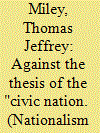

|
|
|
|
|
| Publication |
2007.
|
| Summary/Abstract |
This article combats the empirical deficiencies, theoretical lacunae, and normative biases that beset the literature on nationalism. It focuses on the context of Catalonia in Spain. It documents the diffusion of divergent modes of national identification across different segments of Catalan society. It employs such thick-descriptive detail to challenge the dominant depiction of Catalan nationalism as a "civic nationalism." It demonstrates that the social bases of support for the Catalan nationalist movement are overwhelmingly "ethnic," and that the movement is an elite-led, "top down" project. In addition, it critiques the ideal-typical distinction between "civic" and "ethnic" nationalisms upon which the dominant depiction of Catalan nationalism is based, and it advances an alternative typological distinction between "exclusionary" and "assimilationist" nationalist projects
|
|
|
|
|
|
|
|
|
|
|
|
|
|
|
|
| 4 |
ID:
133127


|
|
|
|
|
| Publication |
2014.
|
| Summary/Abstract |
This article examines the main characteristics of mutinies in the Spanish tercios at the height of the Italian Wars (1494-1559), a surprisingly under-researched subject considering the high frequency of such upheavals in these core infantry units. Contrary to the severe legal and moral implications of modern military mutinies the dynamics of the mutinies in the tercios resembled more closely those of a modern workers' strike, in that the soldiers were allowed room to organize, make representations, negotiate and reach relatively amicable conclusions. Generals and soldiers alike accepted the recurring mutinies as a way of maintaining the organizational status quo in a context of infrequent paydays and persistent supply problems.
|
|
|
|
|
|
|
|
|
|
|
|
|
|
|
|
| 5 |
ID:
112145
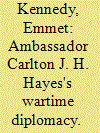

|
|
|
|
|
| Publication |
2012.
|
| Summary/Abstract |
U.S. Ambassador to Spain (1942-1945), Carlton J.H. Hayes, has been often reputed a Francoist. A look at the entire printed and archival record, however, shows Hayes to have been a tough critic of the caudillo's "fascism." This article focusses particularly on Hayes' active role in securing the passage of some 40,000 refugees-French, Anglo-Saxons, Jews and others-across the Pyrenees mostly to North Africa. In retirment, Hayes advocated patient dilomacy, rather than ostracism or subversion of Franco Spain-the policy the U.S. eventually adopted.
|
|
|
|
|
|
|
|
|
|
|
|
|
|
|
|
| 6 |
ID:
125863


|
|
|
|
|
| Publication |
2013.
|
| Summary/Abstract |
Several studies have examined the local economic effects of nuclear power stations. However, their heterogeneity within countries and between countries indicate that one must be very cautious in drawing general conclusions about the positive and negative local economic effects of nuclear power stations over time. Using information about a specific nuclear facility in Spain and its zone of influence, we investigate the local economic impact of a nuclear facility by applying an infrequently used methodology called the "counterfactual" method. The purpose of this application of the counterfactual method is to establish what would have happened if the nuclear power plant had not been built where it was. This method permits observation of the impact of the nuclear power plant on the evolution of a set of variables whose influence is extremely important for the local area, such as the population, unemployment level, per capita income, and municipal governments' revenues. Generalization of this method could offer the possibility of providing comparative results. However, the method must be complemented with other short-term approaches to provide a more specific analysis of the economic effects on the local actors involved and to offer incentives to policymakers to design and develop policies aimed at boosting economic activity in the area.
|
|
|
|
|
|
|
|
|
|
|
|
|
|
|
|
| 7 |
ID:
029790
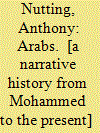

|
|
|
|
|
| Publication |
London, Hollis and Carter Ltd., 1964.
|
| Description |
424p.Hbk
|
|
|
|
|
|
|
|
|
|
|
|
Copies: C:1/I:0,R:0,Q:0
Circulation
| Accession# | Call# | Current Location | Status | Policy | Location |
| 000904 | 909.0974927/NUT 000904 | Main | On Shelf | General | |
|
|
|
|
| 8 |
ID:
123475
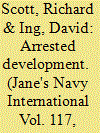

|
|
|
| 9 |
ID:
128397
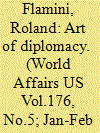

|
|
|
|
|
| Publication |
2014.
|
| Summary/Abstract |
Early in October 2013, a group of high-ranking Greek officials, including Prime Minister Antonis Samaras, came to Washington for the opening of a major art exhibition from their country at the National Gallery of Art. But the black-tie event and the press conference to inaugurate the show, "Heaven and Earth: Art of Byzantium from Greek Collections," were both canceled because of the government shutdown. As a result, a party of angry Greeks left for home muttering darkly about fearing Americans when you bear them gifts. The Greeks were not even allowed a private visit to the exhibition in which virtually every precious icon, ancient manuscript, and piece of mosaic had been loaned by museums and institutions in their country.
|
|
|
|
|
|
|
|
|
|
|
|
|
|
|
|
| 10 |
ID:
122814


|
|
|
|
|
| Publication |
2013.
|
| Summary/Abstract |
This article examines the impact of asymmetrical devolution on mass preferences for devolution and voting behavior in the regions of Spain. Rather than mitigating demands for greater devolution, asymmetry encourages the escalation of such demands in both the ethnically distinct and the majority-dominated regions. Preferences for symmetry and perceptions of inequality that result from asymmetry are transformed into pressures for further devolution via the electoral mechanism. These findings suggest asymmetrical devolution may be an unstable solution for managing ethnoregionalism, and that Stepan, Linz, and Yadav's strong endorsement of asymmetrical federalism as a tool for the management of ethnoregionalism in democracies should be qualified.
|
|
|
|
|
|
|
|
|
|
|
|
|
|
|
|
| 11 |
ID:
133168
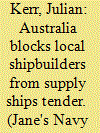

|
|
|
|
|
| Publication |
2014.
|
| Summary/Abstract |
Two large replenishment ships for the Royal Australian Navy (RAN) are to be built in either Spain or South Korea, with the government warning domestic shipyards that other major naval construction programme could also go offshore unless productivity improved.
|
|
|
|
|
|
|
|
|
|
|
|
|
|
|
|
| 12 |
ID:
074891
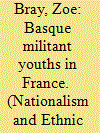

|
|
|
|
|
| Publication |
2006.
|
| Summary/Abstract |
The "ethnonational identity" of young French Basques in France is analyzed in the context of European integration, and compared with the situation in the Spanish Basque Country. Due to the French state's refusal to recognize regional languages, transmission of the Basque language in France is characterized by ethnonationalist values. But these values have shifted recently, from an emphasis on consolidating a Basque nation to practical concerns with grassroots and sustainable development.
|
|
|
|
|
|
|
|
|
|
|
|
|
|
|
|
| 13 |
ID:
119856
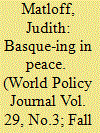

|
|
|
|
|
| Publication |
2012.
|
| Summary/Abstract |
Bilbao, Spain-Political violence was so rampant in the Basque Country in the mid 1980s that local journalists devised a proforma for the weekly bloodshed. Fill in the blank: policeman/soldier/ guard was killed/injured by a bomb/ bullet. The one constant was that the separatist guerrillas, Euskadi Ta Askata-suna, or Basque Homeland and Freedom (ETA), always claimed responsibility.
|
|
|
|
|
|
|
|
|
|
|
|
|
|
|
|
| 14 |
ID:
146806
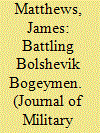

|
|
|
|
|
| Contents |
By placing the anti-Bolshevik reaction in Spain in 1917-1923 in a transnational context, this article adds nuance to a Europe-wide analysis of the era’s counter-revolutionary movements by including a prominent First World War neutral. It also questions the prominent “brutalization” thesis that links postwar violence to trench warfare and military defeat. This cannot explain the widespread and violent social unrest that gripped Spain after 1917. But, rather than reject the war and brutalization thesis entirely, this article contends that the Russian Revolution should be seen as part of a “Greater War” that affected all countries, whether they were formally belligerents or not.
|
|
|
|
|
|
|
|
|
|
|
|
|
|
|
|
| 15 |
ID:
112524
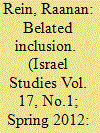

|
|
|
|
|
| Publication |
2012.
|
| Summary/Abstract |
This article analyzes the changing attitudes of the Israeli authorities towards the Jewish veterans of the International Brigades, most of them Communists. Following a brief overview of Jewish participation in general and Jewish Palestinian participation in particular in the Spanish Civil War, we focus our attention first on the initial reactions to the returning volunteers and then on two major events in the process of memory appropriation and gradual inclusion of these fighters in the Israeli national narrative: the 1972 Tel-Aviv conference of Jewish fighters in Spain, sponsored by the Histadrut, and the 1986 speech by Israeli president Chaim Herzog on the 50th anniversary of the outbreak of the Spanish Civil War. Once the fighters' documents were deposited in the archives of the Israel military in the 1990s, the process was complete. Now they could be portrayed as Jewish heroes, national patriots fighting to protect their people and their homeland, Israel.
|
|
|
|
|
|
|
|
|
|
|
|
|
|
|
|
| 16 |
ID:
087516
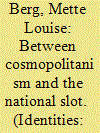

|
|
|
|
|
| Publication |
2009.
|
| Summary/Abstract |
Although cosmopolitanism used to be associated with Western, elite practices, it has in recent years been used to describe a wider array of practices by non-elite and non-Western groups. This article explores the cosmopolitanism of Cuba's "children of the revolution" living in Spain. They are those now young adults who were born in Cuba after the revolution and who were brought up to become the socialist New Man. Theirs was a world of socialist cosmopolitanism, which simultaneously was infused with commitment to a national, territorially-based political project: an independent, socialist Cuba. However, some of these New Men and New Women now embrace ideals of cosmopolitan individualism rather than the patriotic socialism with which they were inculcated as children. Yet the cultural tools that the children of the revolution make use of in their practices and narratives of cosmopolitanism paradoxically point back to revolutionary Cuba. The article argues that cosmopolitanism as a lived practice owes to experiences within the Cuban socialist-national project and is in effect a response to the ineffectiveness of this project, not necessarily a substantive opposition to it. Social capital and habitus deriving from Cuban socialism gave the children of the revolution the desire to attain cosmopolitanism as part of their life-projects. This finding suggests that the relationship between nationalism and cosmopolitanism needs further rethinking.
|
|
|
|
|
|
|
|
|
|
|
|
|
|
|
|
| 17 |
ID:
107158


|
|
|
|
|
| Publication |
2011.
|
| Summary/Abstract |
In 2004, an al Qaeda affiliate killed 191 civilians in Madrid. Spain's general election three days later confounded pollsters' expectations; the incumbent Partido Popular was ousted by the challenging Partido Socialista Obrero Español ( psoe ), a party committed to withdrawal from Iraq. This manuscript examines the notion that this was a strategic terrorist success. The first strategic form considered is coercive bargaining. The paper finds that al Qaeda is not a credible coercive agent and debunks the popular myth that Spanish voters entered a coercive bargain with the network. The paper also considers the attacks through the strategic frameworks of terrorist advertising, provocation, regime destabilization, and morale building. It finds that the attacks' only strategic achievement was building morale. Finally, the paper provides a multi-factor explanation of how the Madrid bombings contributed to the psoe victory despite their lack of strategic impact. The upshot of the analysis is that there is little reason to believe such electoral impact is replicable.
|
|
|
|
|
|
|
|
|
|
|
|
|
|
|
|
| 18 |
ID:
058972
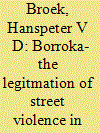

|
|
|
| 19 |
ID:
160874
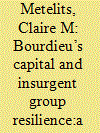

|
|
|
|
|
| Summary/Abstract |
The conflict between the rebel group, the Polisario Front, and the Kingdom of Morocco is nearing its 43rd year. Though under-reported, the conflict itself garners attention for the resilience – some would say tenacity – of the ethnically Sahrawi Polisario Front. Despite shifting regional and international politics and the nearly 150,000 Sahrawi refugees waiting in nearby Algerian camps, the rebel group has survived. What explains its resilience? This article uses Bourdieu’s ‘forms of capital’ to understand the Polisario Front’s persistence. Based on field research in Algeria, Western Sahara, and the United States, it finds that social, cultural, symbolic, and economic capital may provide an explanation.
|
|
|
|
|
|
|
|
|
|
|
|
|
|
|
|
| 20 |
ID:
158178
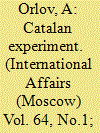

|
|
|
|
|
| Summary/Abstract |
On October 1, the regional powers - the government and the Parliament of Catalonia - carried out a referendum on independence from Spain. The Spanish government (that had gone to all lengths to prevent it) declared its results null and void. Prime Minister of Spain Mariano Rajoy dismissed it as a "democratically deplorable spectacle.
|
|
|
|
|
|
|
|
|
|
|
|
|
|
|
|
|
|
|
|
|